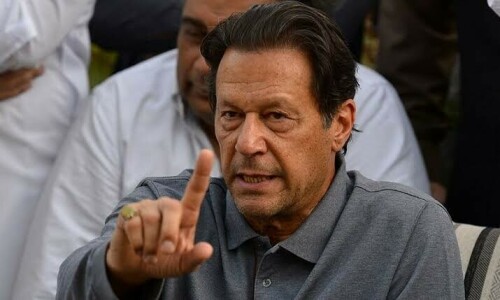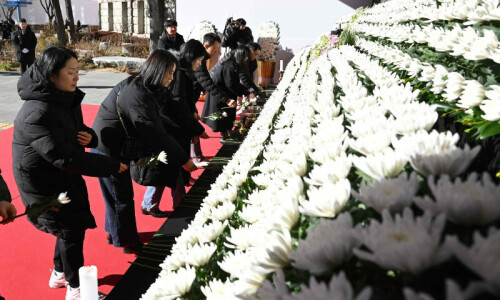ISLAMABAD: Ever since Pakistan ramped up pressure on Afghanistan and the UN refugee agency to repatriate all refugees in the country, very little has been heard from the Afghans themselves about the hurdles and problems associated with the process.
However, on Wednesday, a grand jirga of elders from the Afghan refugee community across the country came together to talk about the problems they faced, in front of leaders and top officials from both countries.
The elders were made to wait over three hours as the minister for states and frontier regions – who was supposed to be one of the panellists at the jirga – was held up by Question Hour at the Senate.
Refugee elders air their concerns in front of top Afghan, Pakistani officials; UNHCR repatriation grant increased to $400 per head
Having come from all parts of the country – there were at least 100 men from Khyber Pakhtunkhwa, 20 from Balochistan and dozens of others from Punjab and AJK, as well as representatives from the Afghan refugee camp in Mianwali – the elders argued, made phone calls and took selfies as they waited for the dignitaries to arrive.
At the outset, both Abdul Qadir Baloch and Sayed Hossein Alimi Balkhi, the visiting Afghan Minister for Refugees and Repatriation, apologised for the inordinate delay, which seemed to placate the expectant audience.
Refugees’ perspective
Biryalai Miankhel, speaking on behalf of Afghan refugees based in KP, listed a number of key issues that Afghans faced with regards to their return to Afghanistan.
He highlighted the identity crisis faced by children of refugees, saying that while people from his generation considered Afghanistan their home, “for the younger generation, Pakistan is their first home”.
But he stressed that after being deprived of their rights for around 40 years now, his compatriots wanted nothing more than to return to Afghanistan with dignity.
He wondered whether Afghanistan would be able to absorb the around 1.5 million returning refugees if they all went back within the stipulated timeframe, i.e. before the end of this year.
He also pointed out that for refugees who had built livelihoods and businesses in Pakistan; it would not be possible to shift their entire setup in one go. “Once we return to Afghanistan on our Proof of Registration (PoR) cards, we can’t use them again and will have to seek visas to return. This is not feasible and both governments should do something to facilitate us,” he said.
Mr Miankhel noted wryly that debtors – who knew Afghan refugees had until the end of this year to leave the country – “have stopped taking our calls”, while creditors “are hounding us”, and called on both countries to form a body that would address financial disputes between citizens on both sides of the border.
He also acknowledged the presence of a number of undocumented Afghans in the country, saying that they should also be registered and allowed to avail the option of voluntary repatriation. According to a UNHCR official, there are around 50,000 refugees who are deemed illegal by Pakistan after they failed to renew their PoR cards after they expired in 2012.
He also drew attention to a social stigma attached to returning refugees, saying: “In Afghanistan, we are labelled ‘ISI agents’, and in we are viewed as ‘Indian agents’.” This was why, he said, Afghan refugees also faced problems with police and law enforcement agencies.
Mr Miankhel also asked what would be the fate of Afghan refugee children who were studying in Pakistan institutions; would they be allowed to return to college or would they also need fresh visas to continue their education.
Afghan commitment
Earlier, extolling the need for them to return Dr Omar Zakhilwal told the elders: “You belong to Afghanistan! Come back and claim your homes and livelihoods. Your return will also bring peace to the land.”
Kabul’s ambassador to Pakistan stressed that the situation in Afghanistan was conducive to their return. “The life of a refugee is very difficult... We can live in poverty, but we cannot live without dignity,” he said, stressing that the Afghan government was doing its utmost to ensure infrastructure development is carried out, even in the remotest parts of the country.
“If [your brethren] can live in Afghanistan, then you can also return,” he said, encouraging them to opt for voluntary repatriation.
“We are ready to go,” was the chorus response from the elders in the audience, prompting Dr Zakhilwal to observe that he would convey their message to Kabul.
Earlier, in his welcome address, Minister for Safron Abdul Qadir Baloch conceded that Pakistan could have extended better hospitality to their Afghan brethren. “I apologise, but we are a poor country, so you could not get the kind of support your compatriots may have received in Western Europe.”
He also announced that the UN refugee agency had increased its repatriation and rehabilitation grant to $400 per person, adding that each family of seven or more would receive at least Rs300,000. “I know this isn’t much, but it will help you start a small business or rebuild your home,” Mr Baloch said.
Published in Dawn, July 21st, 2016











































